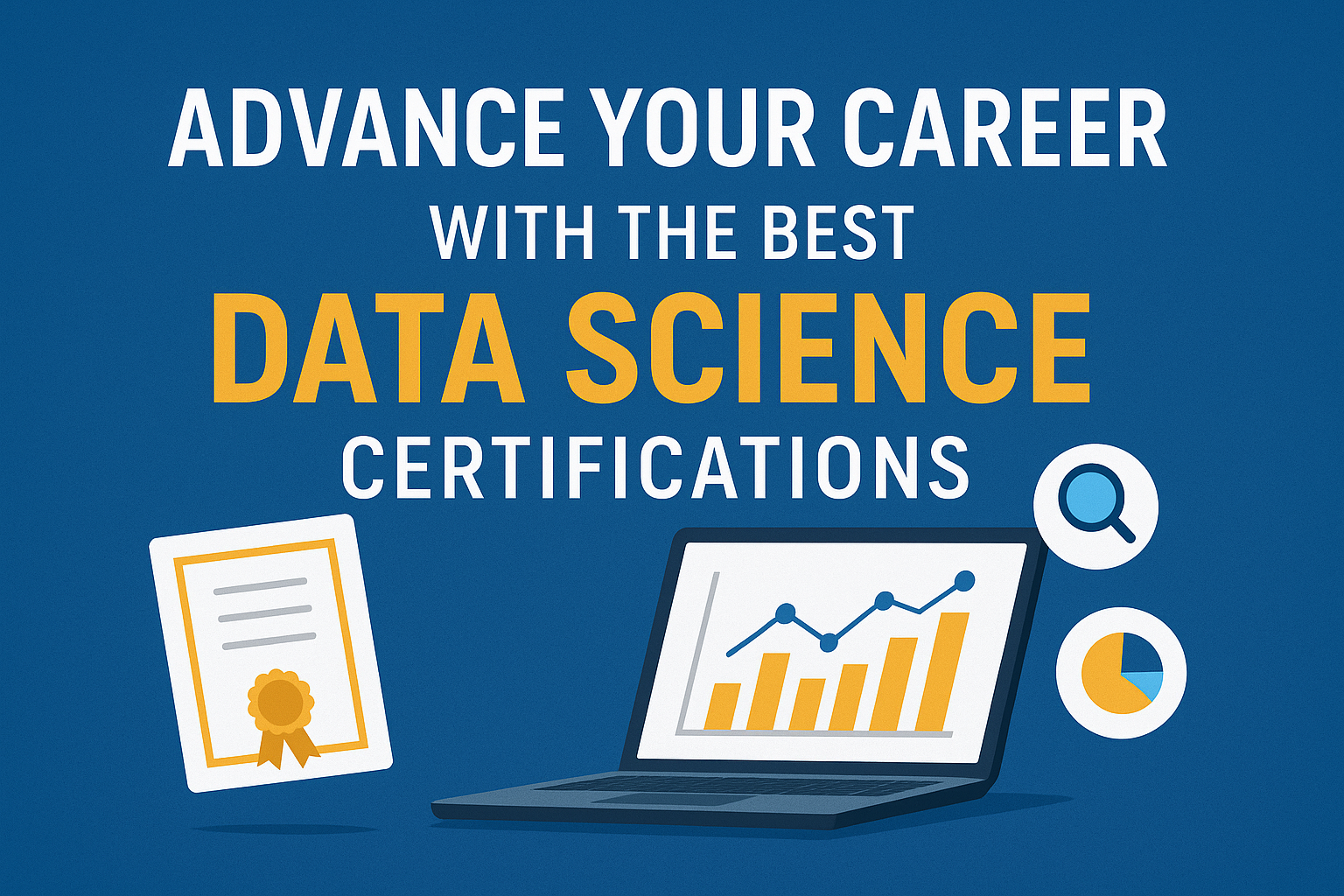Data science isn’t just a skill; it’s a career game-changer. Across industries like tech, finance, healthcare, and environmental solutions, organizations are leveraging data to make smarter, evidence-based decisions. This shift creates a huge opportunity for professionals: the right data science certifications can unlock doors, accelerate growth, and position you as a key player in a field shaping the future.
The demand is real and growing. The U.S. Bureau of Labor Statistics projects around 23,400 annual openings for data scientists over the next decade, driven both by expansion and workforce turnover. Whether starting or aiming for leadership, the best data science certifications will provide the knowledge, credibility, and skills to thrive in this competitive, evolving field.
1. Certified Data Science Professional (CDSP™) – USDSI®
The CDSP™ is meant for those who are just starting out in data science or early-career data science practitioners. In the CDSP™ course, you will learn core concepts in Python programming, data wrangling, visualization, and introductory machine learning. The course duration is 4-25 weeks.
As the course is self-paced, you will receive digital badging, and the course itself is valid for three years. Therefore, it is flexible and also credible as one of the best starting points in data science.
2. Certified Lead Data Scientist (CLDS™) – USDSI®
CLDS™ is designed for professionals, and we expect you to have at least 2 years of relevant experience. The curriculum is heavily focused on advanced analytics, deep learning, NLP, and leadership skills needed to manage end-to-end projects. This will provide learners with not just the technical capability but also the leadership skills to drive data-based strategies across industries. The course duration is 4-25 weeks.
3. Advanced Data Science Professional Certificate—University of Chicago
The data science course at the University of Chicago covers core components such as Bayesian methods, advanced machine learning, and natural language processing. For those who are quantitatively trained and passionate about data science, especially if you have aspirations to be in leadership level data science roles.
4. Data Science Certificate—Harvard Extension School
The Data Science Graduate Certificate from Harvard Extension School is a hybrid, online program offering working professionals the opportunity to develop their data science skills while also maintaining their job status. It is ideal for data analysts, business intelligence professionals, software engineers, and analysts in marketing, healthcare, and other relevant organizations..
5. Graduate Certificate in Statistics and Machine Learning – Princeton University
Princeton’s Graduate Certificate in Statistics and Machine Learning is offered through the Center for Statistics and Machine Learning (CSML). The certificate requirements include completion of specified coursework, participation in appropriate research, and attendance at seminars.
It is appropriate for graduate students interested in pursuing expertise in computational approaches and advanced modeling methods as a complement to their degree requirements.
6. Environmental Data Science Certificate Program – Yale University
Yale’s School of the Environment provides an Environmental Data Science Certificate Program, a six month program for students and professionals to learn data collection, visualization, and modeling to solve environmental problems. The format of the program includes lectures, exercises, culminating in a capstone project of applying data science to environmental challenges.
7. Applied AI & Data Science Certificate – Brown University
The Applied AI & Data Science Certificate is a program run by Brown’s School of Professional Studies. The program is designed to give participants fundamental AI, ML, and data science skills to solve business problems in the real world. It is a blend of theory and application and prepares learners to create models that directly drive decision-making within their organizations.
8. Certificate in Data Analytics – University of Pennsylvania
Penn’s Certificate in Data Analytics is a four-course program completely taught by Penn faculty through the School of Arts and Sciences. The curriculum covers exploratory data analysis, statistical methods, machine learning, and applications in business and policy. The program is aimed at professionals who want to have structured knowledge without entering a full degree program.
9. Certification of Professional Achievement in Data Sciences – Columbia University
Columbia Engineering offers the Certification of Professional Achievement in Data Sciences as a part of the Columbia Video Network. To obtain the certification, candidates have to complete (4) courses (12 credits) (data science algorithms, probability and statistics, machine learning, and exploratory data analysis). This certificate has a high standing due to its academic rigor and focus on research.
10. Computational and Data Science Certificate – Cornell University (M.Eng. Track)
Cornell offers a Computational and Data Science Certificate for students pursuing a Master of Engineering degree. This credential requires a minimum of technical coursework in scientific computing, technical computing, statistical modeling, and data engineering. Therefore, the certificate indicates mastery within both computational and applied data science, which may improve your candidacy for roles in research and industry.
Conclusion
Data science is a strategic advantage rather than only a talent. Obtaining the right certification not only proves your competence but also provides access to opportunities that require both technical know-how and real-world problem-solving skills. Successful practitioners of the future will be those who combine formal education with practical experience to transform real-world problems into strategic answers.
You may position yourself to stand out in your profession, make a significant impact, and further your career beyond simply obtaining a credential by carefully and purposefully choosing certification programs.




